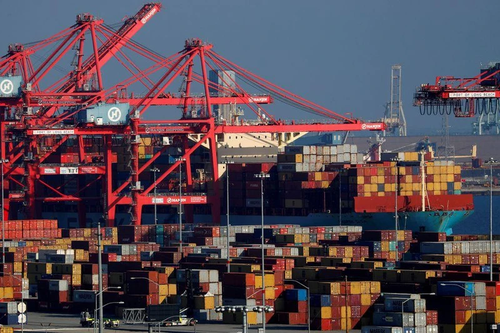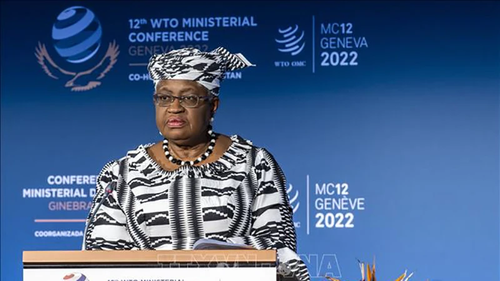 Containers at Long Beach port in California, the US (photo: Reuters) Containers at Long Beach port in California, the US (photo: Reuters) |
WTO Director-General Ngozi Okonjo-Iweala said the biggest takeaway from the report is its reaffirmation of trade's transformative role in reducing poverty and creating shared prosperity. However, international trade is being eroded by a number of challenges.
Trade’s transformative role
The report says that in the 1995-2022 period, the share of low- and middle-income economies in global trade increased from 21% to 38%. This is due to the high trade share in GDP of countries, which is always proportional to higher economic growth rates. In the reviewed period, per capita income in low- and middle-income countries tripled. Since 1995, global trade has expanded rapidly, lifting 1.5 billion people out of extreme poverty.
Moreover, membership in the WTO and its predecessor, the General Agreement on Tariffs and Trade (GATT), has boosted trade between members by an average of 140%, while economies that undergo rigorous WTO accession negotiations are shown to grow 1.5 percentage points faster during their accession period.
Analysis further suggests that trade cost reductions between 1995 and 2020 led to a 20-35% faster income convergence of low- and middle-income economies with high-income economies.
WTO chief economist Ralph Ossa said: “This trade-led convergence has improved the lives of hundreds of millions of people. The share of people living in extreme poverty in low- and middle-income economies has dropped from 40% to around 11% since 1995, while the share of trade in these economies' GDP has doubled from 16% to 32%.”
However, the WTO warns that a surge in protectionism, including higher import tariffs in rich countries, is threatening the achievements of trade globalization made over the past three decades. The WTO says growing tariff barriers between economies have a greater impact on low-income households, women, and small businesses, as they have greater difficulty coping with rising trade costs. The US, Canada, and the EU have recently imposed tax hikes on Chinese electric vehicles, forcing consumers in those countries to pay more.
 WTO Director-General Ngozi Okonjo-Iweala (photo: AFP/VNA) WTO Director-General Ngozi Okonjo-Iweala (photo: AFP/VNA) |
Challenges to sustainable, inclusive trade
Besides risks posed by the return of protectionism, global trade has to address the challenge of unsustainable development as climate change threatens to destroy the economic achievements of many countries and communities.
These are among the topics being discussed at the Public Forum held by the WTO and its partners from September 10-13 in Geneva, Switzerland. During the four days of the forum 140 discussions are focused on making global trade benefit all stakeholders and responding more effectively to growingly serious impacts of climate change.
On the first day of the Forum the WTO launched the WTO Trade Concerns Database (TCD) which, according to WTO Deputy Director-General Angela Elllard, is a landmark initiative to increase transparency and accessibility to essential information in the multilateral trading system. The TDC will allow WTO members to learn about the 1,800 trade concerns submitted to the WTO since it was founded in 1995. The data concerns tariff barriers, technical barriers, subsidies, and barriers to market access.
WTO Chief Economist Ralph Ossa said information transparency will enhance cooperation among WTO members and promote trade inclusiveness.
“The bottom line of our analysis is this: less trade will not promote inclusiveness, nor will trade alone. True inclusiveness demands a comprehensive strategy, one that integrates open trade with supportive domestic policies and effective international cooperation,” said the WTO Chief.
Another major challenge to global trade is geopolitical tensions around the world. On the first day of the Geneva Forum, the WTO and the Peterson Institute for International Economics co-hosted a discussion called “Re-globalization: Trade in a Geopoliticized World” on strategies to maintain and promote global trade flows amid growing geopolitical competition and conflict.
The impact of artificial intelligence on supply chains, trade digitalization, and competition for essential minerals pose additional challenges to global trade.